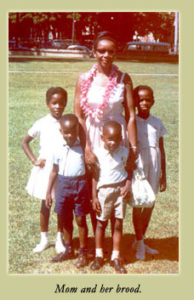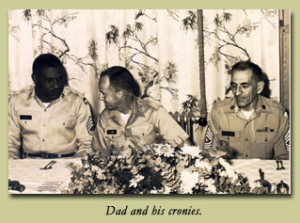 History only tells of some migrations. The rest we must tell ourselves.
History only tells of some migrations. The rest we must tell ourselves.
And so it came to pass that Duly, a Crucian woman of unrivaled beauty and charm, the eldest of the Dowards — a clan known for seasoned rice and fine quadrille dancing — gave birth to me on a military base in Parker County, Texas on the 21st day of January, in the year 1960 of our Lord.
My spirit longed for a birth in the Caribbean, but my father was a sergeant in the U.S. Army and that meant frequent travel. After Texas it was on to California and then to Japan, where Gene, my younger brother, was born. Joan and Joann, my older twin sisters, were born in San Juan, Puerto Rico.
I was five when my father retired from the military, and we moved back to St. Croix to live. I grew up in Frederiksted, the western end of the island. Both of my parents and most of relatives were born and raised here. My sense of who I am and what I am germinated in this quiet town. Since then, I have flowered and sown seeds of my own. When I am no longer able to tread this charred, sacred earth, with you, my friend, I wish to be returned to ancestral soil — or perhaps to the sea.
 My earliest memories of the island consist of images of my grandmother’s house interspersed with images of ducks, the Frederiksted cemetery, and my cousins, the Baileys and the Walkers. Grandma lived on a gently sloping hill near the cemetery. The ducks belonged to the Baileys, who lived across the street. Inez Bailey fell in love with Jerome Walker, and thus my cousins Joseph, Lorraine, Francis, Steven, Clayton and Bernadette came into being.
My earliest memories of the island consist of images of my grandmother’s house interspersed with images of ducks, the Frederiksted cemetery, and my cousins, the Baileys and the Walkers. Grandma lived on a gently sloping hill near the cemetery. The ducks belonged to the Baileys, who lived across the street. Inez Bailey fell in love with Jerome Walker, and thus my cousins Joseph, Lorraine, Francis, Steven, Clayton and Bernadette came into being.
Growing up all Crucian children, I’m sure, heard elders talk about “donkey years. ” Donkey years refers to that era of island life prior to automobiles. It also refers to simpler times, when our ancestors cooked on coal pots, brushed their teeth with ashes, walked barefoot to school, herded the goats, fed the pigs, tended the chickens, drank goat’s milk, washed clothes by hand and trusted in the Lord.
On moonlit nights, says my mother, a towering hulk of man named “Gentleman John,” would travel from region to region to entertain them with tales of “Anansi,” the clever West African spider. They also played games, and heard stories about Bru Dog and Bru Cat.
On the way home from school, children would stop along the way to pick tamarinds, coconut, hog plums, mangos and other tropical fruits.
“Those were the good old days,” says my mother. “We didn’t have the radio or the T.V., but we had each other.”
